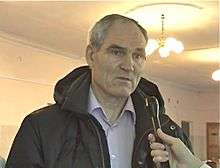Alexander Pushnitsa
Alexander Pushnitsa (November 1, 1949, village Korenovo, Vengerovskiy District, Novosibirsk Oblast, RSFSR, USSR) - the most titled sambist in history of Sambo, Merited Master of Sports of the USSR (1980), nine-time champion of the USSR (1974 - 1980, 1983, 1984),[1] two-time European champion (1976, 1984) and three-time winner of the world championships (1974, 1979, 1983). He was a permanent captain of the Soviet Union Sambo team for 15 years.[2] In 1997 in Paris he won the European Championship for Sambo Veterans.
A graduate of the Omsk State Institute of Physical Culture (1987).[3]
Honorary Citizen of the city of Omsk. Deputy Chairman of Sambo Federation of the Omsk region, head of the sports school "Sambo-2000."
Since 2000 annual open Russian Sambo tournament is held in Omsk for the prizes of Alexander Pushnitsa.[4]
| Alexander Pushnitsa Александр Пушница | |
|---|---|
 Alexander Pushnitsa, 2013 | |
| Born | November 1, 1949 Novosibirsk Oblast, Russian SFSR, Soviet Union |
| Nationality | Russian |
| Height | 184 cm (6 ft 0 in) |
| Weight | 90–100 kg (198–220 lb; 14 st 2 lb–15 st 10 lb) |
| Division | light heavyweight |
| Style | Sambo |
| Team | Dynamo |
| Trainer | S.E. Galkin, V.R. Grozin (Solovyov) |
| Rank | Merited Master of Sports of the USSR |
| Years active | 1968-1988 |
| Medal record | ||
|---|---|---|
| Men's Sambo | ||
| World Championships | ||
| 1974 | -90 kg | |
| 1979 | -90 kg | |
| 1981 | -90 kg | |
| 1983 | -90 kg | |
| European Championships | ||
| 1976 | -90 kg | |
| 1984 | -90 kg | |
| USSR National Championships | ||
| 1974 | -90 kg | |
| 1975 | -90 kg | |
| 1976 | -100 kg | |
| 1977 | -90 kg | |
| 1978 | -90 kg | |
| 1979 | -90 kg | |
| 1980 | -90 kg | |
| 1981 | -90 kg | |
| 1982 | -90 kg | |
| 1983 | -90 kg | |
| 1984 | -90 kg | |
| 1986 | -90 kg | |
| 1987 | -90 kg | |
Biography
Alexander's father and mother were rural teachers. Alexander grew up in a village. He liked fight since childhood. Boys usually fought on the ground, not observing any rules. Most often Alexander struggled with his twin brother Vladimir [subsequently International Master of Sports in Sambo and three-time bronze medalist (1977, 1978, 1982) of the USSR Championships].[1] There was no television in that village, and the brothers knew nothing about Sambo.[5] Father of Alexander and Vladimir, a veteran of World War II, instilled them a love to peasant labor and sports. Brothers loved not only fight, but also cross-country skiing, playing soccer and hockey. Alexander was endowed with agility, endurance, speed, tenacity, determination and patience. His desire to win competitions began to manifest itself in early childhood. When he was fifteen, Alexander began to win in the village self-made championships. Adult men participated in those competitions. In the final fight Alexander usually met with his brother Vladimir.[6]
Labor way[5]
- 1964-1968 - a mechanic (Temirtau);
- 1968-1970 - served in the Soviet Army;
- 1970-1971 - concrete worker (Frunze);
- 1971-1973 - Inspector of Investigation Group (Frunze);
- 1973-1993 - Inspector of combat and physical training (Omsk);
- 1993–present - Sambo coach, head of the sports club "Sambo-2000" (Omsk).
Sports path
Alexander started training Sambo while serving in the Soviet Army (1968).
In 1971 he became Master of Sports of the USSR.
In 1980 he was awarded the title of Merited Master of Sports of the USSR.
Results of competitions
1973 - Champion of sports society "Dynamo" (USSR).
1974 - World Champion and Champion of the USSR.
1975 - Champion of the USSR.
1976 - European Champion and Champion of the USSR.
1977 - Champion of the USSR.
1978 - Champion of the USSR.
1979 - World Champion and Champion of the USSR.
1980 - Champion of the USSR.
1981 - Bronze Medalist of the USSR Championship.
1982 - Silver Medalist of the USSR Championship.
1983 - World Champion and Champion of the USSR.
1984 - European Champion and Champion of the USSR.
1986 - Silver Medalist of the USSR Championship.
1987 - Silver Medalist of the USSR Championship.
The style of fighting
Famous Sambo coach Eugene Chumakov (the most successful disciple of Anatoly Kharlampiev) said that the style and the results of fights of Alexander Pushnitsa - best propaganda of Sambo in the international sports arena.
References
- Результаты чемпионатов СССР и России по борьбе самбо (Results of the USSR championships and Russian sambo)
- "Самый титулованный самбист в истории (The most titled sambist in history)". Archived from the original on 2014-05-02. Retrieved 2014-05-01.
- Пушница Александр Михайлович (Alexander Pushnitsa)
- "Всероссийский турнир по самбо на призы Александра Пушницы (Russian sambo tournament for the prizes of Alexander Pushnitsa)". Archived from the original on 2014-05-02. Retrieved 2014-05-01.
- Евгений Гаврилов. Интервью с Александром Пушницей (Evgeny Gavrilov. Interview with Alexander Pushnitsa)
- "Александр Лютиков. С трудом уговорили уйти из самбо (Alexander Lyutikov. With difficulty persuaded to stop participating in Sambo competitions)". Archived from the original on 2014-05-02. Retrieved 2014-05-01.